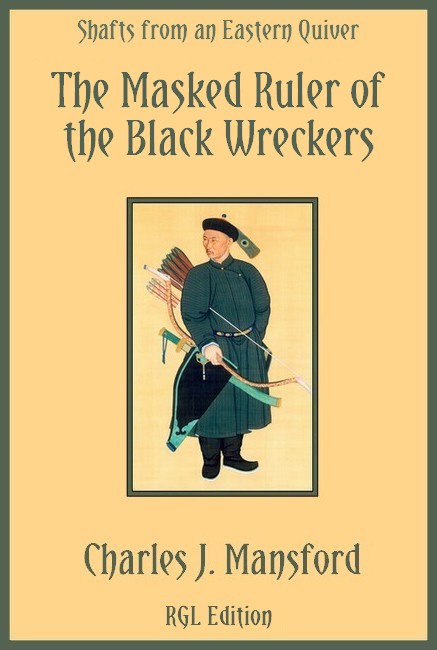
RGL e-Book Cover©
Roy Glashan's Library
Non sibi sed omnibus
Go to Home Page
This work is out of copyright in countries with a copyright
period of 70 years or less, after the year of the author's death.
If it is under copyright in your country of residence,
do not download or redistribute this file.
Original content added by RGL (e.g., introductions, notes,
RGL covers) is proprietary and protected by copyright.

RGL e-Book Cover©


Shafts from an Eastern Quiver, George Newnes, 1893, with:
"The Masked Ruler of the Black Wreckers"
THESE stories ... introduce the lover of sensations to a new writer, who is not at all unworthy to be placed upon the same shelf with Mr. Conan Doyle. He certainly contrives to give the three heroes of this book—the two Englishmen, Frank Denviers and Harold Derwent, and their marvellous Arab servant and good genius Hassan—as many hairbreadth escapes and other adventures by sea and land as can well be packed into a volume of less than three hundred pages.
Mr. Mansford appears to be most at home in Persia, Afghanistan, and India. But he does not confine his literary attentions to the more strictly Eastern countries; on the contrary, one of his most thrilling stories tells of the experiences of the fortunate three among Papuan wreckers, and another relates the escape of an exile from Siberia.
Undoubtedly Mr. Mansford has the gift of the story-teller, and besides, he uniformly writes like a scholar. The illustrations of the book, though small and unpretentious, are admirably executed, and enhance the piquancy—though that was hardly needed—of the letterpress.
The Spectator, 1 December 1894

"HASSAN," called Denviers to our guide in an imperative tone, as the latter was looking longingly at the wide expanse of sea over which our hoat was helplessly drifting, "lie down yonder immediately!" The Arab rose slowly and reluctantly, and then extended himself at the bottom of the boat out of sight of the tempting waters.
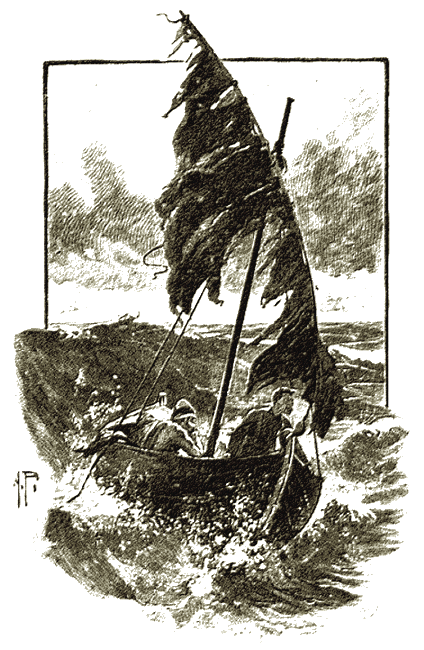
Helplessly drifting...
"How much longer are these torments to last, Frank?" I asked wearily, as I looked into the gaunt, haggard face of my companion as we sat in the prow of our frail craft and gazed anxiously but almost hopelessly onward to see if land might even yet loom up in the distance.
"Can't say, Harold," he responded; "but I think we can hold out for two more days, and surely by that time we shall either reach some island or else be rescued by a passing vessel."
Two more days—forty-eight more hours of this burning heat and thirst! I glanced most uneasily at our guide as he lay impassively in the boat, then I continued:—
"Do you think that Hassan will be able to resist the temptation of these maddening waters round us for so long as that?" There was a serious look which crossed Denviers' face as he quietly replied:—
"I hope so, Harold; we are doing our best for him. The Arab gets a double share now of our pitifully slender stock, although, happily, he doesn't know it; if he did he would certainly refuse to tike his dole of rice and scanty draught of water, and then I'm afraid that it would be all over with him. He bears up bravely enough, but I don't at all like the bright look in his eyes which has been there for the last few hours. We must have travelled now more than half way across the Bay of Bengal with such a driving wind as this behind us. It's certainly lucky for us that our valuables were not on board the other boat, for we shall never see that again, nor its cowardly occupants. The horses, our tent, and some of our weapons are, of course, gone altogether, but we shall he able to shift for ourselves well enough if once we are so lucky as to reach land again.
"I can't see of what use any weapons are just at present," I responded, "nor, for the matter of that, the gems which we have hidden about our persons. For the whole five days during which we have been driven on by this fierce, howling wind I have not seen a living thing except ourselves—not even a bird of the smallest size."
"Because they know more about these storms than we do, and make for the land accordingly," said Denviers; then glancing again at the Arab, he continued:—
"We must watch Hassan very closely, and if he shows signs of being at all likely to lose his self-control, we shall have to tie him down. We owe a great deal to him in this present difficulty, because it was entirely through his advice that we brought any provisions with us at all."
"That is true enough," I replied; "but how were we to know that a journey which we expected would occupy less than six hours was to end in our being cast adrift at the mercy of wind and wave in such a mere cockle-shell as this boat is, and so driven sheer across this waste of waters?"
"Well, Harold," said Denviers, quietly, "we must stick to our original plan of resting turn and turn about if we wish to keep ourselves alive as long as possible. I will continue my watch from the prow, and meantime you had better endeavour to obtain some rest; at all events we won't give in just yet."
He turned his head away from me as he spoke and narrowly surveyed the scene around us, magnificent as it was, notwithstanding its solitude and the perils which darkly threatened us.
Leaving the hut of the Cingalese after our adventure with the Dhahs in the forest of Ceylon, we had made our way to Trincomalee, where we had embarked upon a small sailing boat, similar in size and shape to those which may be constantly seen on the other side of the island, and which are used by the pearl- divers. We had heard of some wonderful sea-worn caves, which were to be seen on the rocky coast at some distance from Trincomalee, and had thus set out, intending afterwards to land on a more southerly portion of the island—for we had determined to traverse the coast, and, returning to Colombo again, to take ship for Burmah. Our possessions were placed in a second boat, which had a planked covering of a rounded form, beneath which they were secured from the dashing spray affecting them. We had scarcely got out for about an hour's distance when the natives stolidly refused to proceed farther, declaring that a violent storm was about to burst upon us. We, however, insisted on continuing our journey, when those in the second boat suddenly turned its prow round and made hastily for the land, at the same time that our own boatman dived from the side and dexterously clambered up on the retreating boat, leaving us to shift for ourselves as best we could. Their fears were only too well grounded, for before we were able to make an attempt to follow them as they coolly made off with our property in the boat, the wind struck our own little boat heavily, and out to sea we went, driven through the rapidly rising waves in spite of our efforts to render the boat manageable.
For five days we had now been whirled violently along; a little water and a few handfuls of rice being all that we had to share between the three of us who occupied the boat, and upon whom the sun each day beat fiercely down in a white heat, increasing our sufferings ten-fold—the effects of which could be seen plainly enough as we looked into each other's faces.
Behind us the sun had just set in a sky that the waves seemed to meet in the distance, and to be blended with them into one vast purple and crimson heaving mass. Round us and before us, the waters curled up into giant waves, which flung high into the air ridges of white foam and then fell sheer down into a yawning gulf, only to rise again nearer and nearer to the quivering sides of our frail craft, which still pressed on—on to where we expected to meet with death rather than rescue, as we saw the ripped sail dip itself into the seething waters like the wing of a wounded sea-bird.
Following my companion's suggestion I lay down and closed my eyes, and was so much exhausted, indeed, that before long I fell into a restless sleep, from which I at last awoke to hear Denviers speaking to me as he shook my arm gently to arouse me.
"Harold," he said, in a subdued tone, "I want you to see whether I am deceiving myself or not. Come to the prow of the boat and tell me what you can see from there."
I rose slowly, and as I did so gave a glance at the Arab, who was lying quite still in the bottom of the boat, where Denviers had commanded him to rest some hours before. Then, following the direction in which my companion pointed, I looked far out across the waves. The storm had abated considerably in the hours during which I had slept, for the waters which stretched round us were becoming as still as the starlit sky above. Looking carefully ahead of us, I thought that in the distance I could discern the faint flicker of a flame, and accordingly pointed it out to Denviers.
"Then I am not mistaken," he exclaimed. "I have been watching it for some time, and as as the waves have become less violent, it seemed to shine out; but I was afraid that after all I might be deluding myself by raising such a hope of assistance, for, as you know, our guide Hassan has been seeing land all day, which, unfortunately for us, only existed in his imagination."
"He is asleep," I responded; "we will watch this light together, and when we get near to it, then he can be awakened if necessary." We slowly drew closer and closer to the flame, and then we thought that we could discern before us the mast of a vessel, from which the light seemed to be hung out into the air. At last we were sufficiently near to clearly distinguish the mast, which was evidently rising from out of the sea, for the hull of the vessel was not apparent to us, even when we were cast close to it.
"A wreck!" cried Denviers, leaning over the prow of our boat "We were not the only ones who suffered from the effects of the driving storm." Then pointing a little to the east of the mast, he continued:—
"There is land at last, for the tops of several trees are plainly to be seen." I looked eastward as he spoke, and then back again to the mast of the vessel.
"We have been seen by those clinging yonder," I exclaimed. "There is a man evidently signalling to us to save him." Denviers scanned the mast before us, and replied:—
"There is only one man clinging there, Harold. What a strange being he is—look!" Clinging to the rigging rigging with one hand, a man, who was perfectly black and almost clothless, could seen holding aloft towards us a blazing torch, the glare of which fell full upon his face.
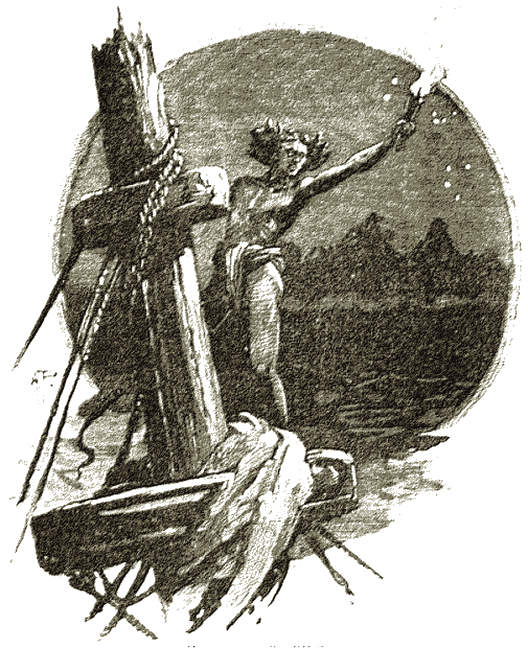
A strange being.
"We must save him," said Denviers, "but I'm afraid there will be some difficulty in doing so. Wake Hassan as quickly as you can." I roused the Arab, and when he scanned the face and form of the apparently wrecked man he said, in a puzzled tone:—
"Sahibs, the man looks like a Papuan, but we are far too distant from their land for that to be so."
"The mast and ropes seem to me to be very much weather- beaten," I interposed, as the light showed them clearly. "Why, the wreck is an old one!"
"Jump!" cried Denviers, at that moment, to the man clinging to the rigging, just as the waters, with a swirl, sent us past the ship. The watcher flung his blazing torch into the waves, and the hiss of the brand was followed by a splash in the sea. The holder of it had dived from the rigging and directly after reappeared and clambered into our boat, saved from death, as we thought—little knowing the fell purpose for which he had been stationed to hold out the flaring torch as a welcoming beacon to be seen afar by any vessel in distress.
I glanced at the dangerous ring of coral reef round the island on which the ship had once struck, and then looked at the repulsive islander, who sat gazing at us with a savage leer. Although somewhat resembling a Papuan, as Hassan had said, we were soon destined to know what he really was, for the Arab, who had been glancing narrowly and suspiciously at the man, whispered to us cautiously:—
"Sahibs, trust not this islander. We must have reached the land where the Tamils dwell. They have a sinister reputation, which even your slave has heard. This savage is one of those who lure ships on to the coral reefs, and of whom dark stories are told. He is a black wrecker!"
We managed by means of Hassan to communicate to the man who was with us in the boat that we were desperately in need of food, to which he made some unintelligible response. Hassan pressed the question upon him again, and then he volunteered to take our boat through the dangerous reefs which were distinguishable in the clear waters, and to conduct us to the shore of the island, which we saw was beautifully wooded. He managed the boat with considerable skill, and when at last we found ourselves upon land once again, we began to think that, perhaps, after all, the natives might be friendly disposed towards us.
Our new-found guide entered a slight crevice in the limestone rock, and came forth armed with a stout spear tipped, as we afterwards found, with a shark's tooth.
"I suppose we must trust to fortune," said Denviers, as we carefully followed the black in single file over a surface which seemed to be covered with a mass of holes.
"We must get food somehow," I responded. "It will be just as safe to follow this Tamil as to remain on the shore waiting for daybreak. No doubt, if we did so the news of our arrival would be taken to the tribe and an attack made upon us. Thank goodness, our pistols are in our belts after all, although our other weapons went with the rest of the things which we lost."
The ground which we were traversing now began to assume more the appearance of a zigzag pathway, leading steeply downward, however, for we could see it as it twisted far below us, and apparently led into a plain. The Tamil who was leading the way seemed to purposely avoid any conversation with us, and Denviers catching up to him grasped him by the shoulder. The savage stopped suddenly and shortened his hold upon the spear, while his face glowed with all the fury of his fierce nature.
"Where does this path lead to?" Denviers asked, making a motion towards it to explain the information which he desired to obtain. Hassan hurried up and explained the words which were returned in a guttural tone:—
"To where the food for which ye asked may be obtained."
The path now began to widen out, and we found ourselves, on passing over the plain which we had seen from above, entering a vast grotto from the roof of which long crystal prisms hung, while here and there natural pillars of limestone seemed to give their support to the roof above. Our strange guide now fastened a torch of some resinous material to the butt end of his spear and held it high above us as we slowly followed him, keeping close to each other so as to avoid being taken by surprise.
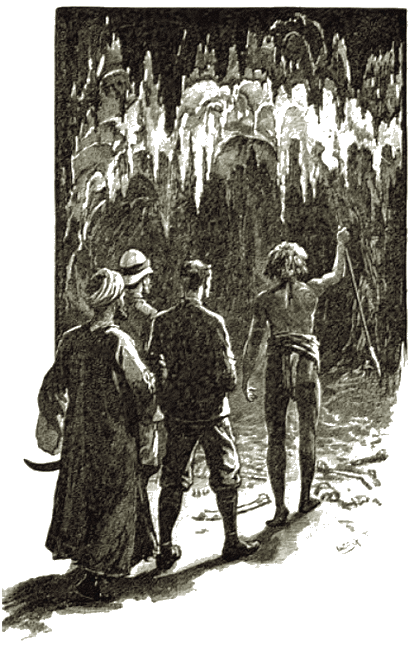
We slowly followed him.
The floor of this grotto was strewn with the bones of some animal, and soon we discovered that we were entering the haunt of the Tamil tribe. From the far end of the grotto we heard the sound of voices, and as we approached saw the gleam of a wood fire lighting up the scene before us. Round this were gathered a number of the tribe to which the man belonged, their spears resting in their hands as though they were ever watchful and ready to make an attack. Uttering a peculiar bird-like cry, the savage thus apprised the others of our approach, whereupon they hastily rose from the fire and spread out so that on our nearing them we were immediately surrounded.
"Hassan," said Denviers, "tell these grinning niggers that we mean to go no farther until they have provided us with food."
The Arab managed to make himself understood, for the savage who had led us into the snare pointed to one of the caverns which ran off from the main grotto, and said:—
"Sports of the ocean current, which brought ye into the way whence ye may see the Great Tamil, enter there and food shall be given to ye."
We entered the place pointed out with considerable misgivings, for we had not forgotten the plot of the Hindu fakir. We could see very little of its interior, which was only partly lighted by the torch which the Tamil still carried affixed to his spear. He left us there for a few minutes, during which we rested on the limestone floor, and, being unable to distinguish any part of the cavern around us, we watched the entry closely, fearing attack. The shadows of many spears were flung before us by the torch, and, concluding that we were being carefully guarded, we decided to await quietly the Tamil's return. The much-needed food was at length brought to us, and consisted of charred fragments of fish, in addition to some fruit, which served us instead of water, for none of the last was given to us. The savage contemptuously threw what he had brought at our feet, and then departed. Being anxious to escape, we ventured to approach again the entrance of the cavern, but found ourselves immediately confronted by a dozen blacks, who held their spears in a threatening manner as they glared fiercely at us, and uttered a warning exclamation.
"Back to the cave!" they cried, and thinking that it would be unwise for us to endeavour to fight our way through them till day dawned, we returned reluctantly, and threw ourselves down where we had rested before. After some time, the Tamil who evidently looked upon us as his own prisoners entered the cavern, and with a shrill laugh motioned to us to follow him. We rose, and re- entering the grotto, were led by the savage through it, until at last we stood confronting a being at whom we gazed in amazement for some few minutes.
Impassive and motionless, the one whom we faced rested upon a curiously-carved throne of state. One hand of the monarch held a spear, the butt end of which rested upon the ground, while the other hung rigidly to his side. But the glare which came from the torches which several of the Tamils had affixed to their spears revealed to us no view of the face of the one sitting there, for, over it, to prevent this, was a hideous mask, somewhat similar to that which exorcists wear in many Eastern countries. The nose was perfectly flat, from the sides of the head large ears protruded, huge tusks took the place of teeth, while the leering eyes were made of some reddish, glassy substance, the entire mask presenting a most repulsive appearance, being evidently intended to strike terror into those who beheld it. The strangest part of the scene was that one of the Tamils stood close by the side of the masked monarch, and seemed to act as interpreter, for the ruler never spoke, although the questions put by his subject soon convinced us that we were likely to have to fight our way out of the power of the savage horde.
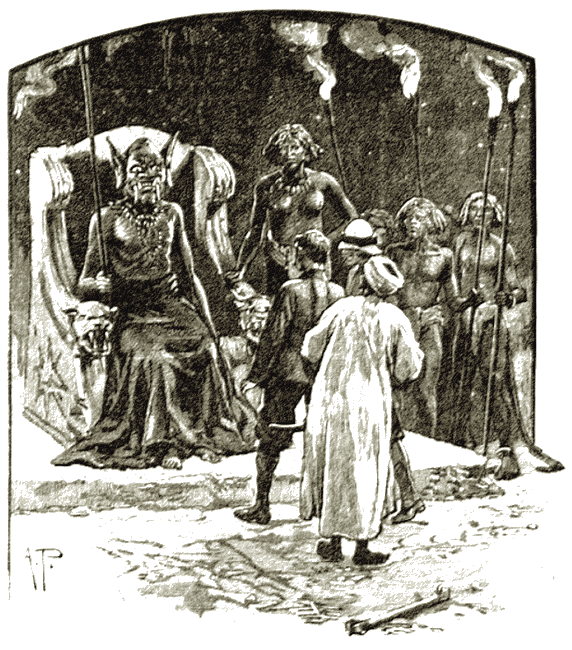
The Great Tamil.
"The Great Tamil would know why ye dared to land upon his sacred shores?" the fierce interpreter asked us. Denviers turned to Hassan, and said:—
"Tell the Great Tamil who hides his ugly face behind this mask that his treacherous subject brought us, and that we want to leave his shores as soon as we can." Hassan responded to the question, then the savage asked:—
"Will ye present your belts and weapons to the Great Tamil as a peace offering?" We looked at the savage in surprise for a moment, wondering if he shrewdly guessed that we had anything valuable concealed there. We soon conjectured rightly that this was only a ruse on his part to disarm us, and Hassan was instructed to say that we never gave away our weapons or belts to friends or foes.
"Then the Great Tamil orders that ye be imprisoned in the cavern from which ye have come into his presence until ye fulfil his command," said the one who was apparently employed as interpreter to the motionless ruler. We signified our readiness to return to the cave, for we thought that if attacked there we should have enemies only in front of us, whereas at that moment we were entirely surrounded. The fierce guards as they conducted us back endeavoured to incite us to an attack, for they several times viciously struck us with the butts of their spears, but, following Denviers' example, I managed to restrain my anger, waiting for a good opportunity to amply repay them for the insult.
"What a strange ruler, Harold," said Denviers, as we found ourselves once more imprisoned within the cave.
"He made no attempt to speak," I responded; "at all events, I did not hear any words come from his lips. It looked like a piece of masquerading more than the interrogation of three prisoners. I wonder if there is any way of escaping out of this place other than by the entrance through which we came."
"We may as well try to find one," said Denviers, and accordingly we groped about the dim cave, running our hands over its roughened sides, but could discover no means of egress.
"We must take our chance, that is all," said my companion, when our efforts had proved unsuccessful. "I expect that they will make a strong attempt to disarm us, if nothing worse than that befalls us. These savages have a mania for getting possession of civilized weapons. One of our pistols would be to them a great treasure."
"Did you notice the bones which strewed the cavern when we entered?" I interrupted, for a strange thought occurred to me.
"Hush! Harold," Denviers whispered, as we reclined on the hard granite flooring of the cave. "I don't think Hassan observed them, and there is no need to let him know what we I infer from them until we cannot prevent it. There is no reason why we should hide from each other the fact that these savages are evidently cannibals, which is in my opinion the reason why they lure vessels upon the reefs here. I noticed that several of them wore bracelets round their arms and ankles, taken no doubt from their victims. I should think that in a storm like the one which drove us hither, many vessels have drifted at times this way. We shall have to fight for our lives, that is pretty certain; I hope it will be in daylight, for as it is we should be impaled on their spears without having the satisfaction of first shooting a few of them."
"Sahibs," said Hassan, who had been resting at a little distance from us, "it will be best for us to seek repose in order to be fit for fighting, if necessary, when these savages demand our weapons."
"Well, Hassan," said Denviers, "you are better off than we are. True we have our pistols, but your sword has never left your side, and I dare say you will find plenty of use for it before long."
"If the Prophet so wills," said the Arab, "it will be at the service of the Englishmen. I rested for many hours on the boat before we reached this land, and will now keep watch lest any treachery be attempted by these Tamils." We knew that under the circumstances Hassan's keen sense of hearing would be more valuable than our own, and after a slight protest agreed to leave him to his self-imposed task of watching while we slept. He moved close to the entrance of the cave, and we followed his example before seeking repose. Hassan made some further remark, to which I do not clearly remember responding, the next event recalled being that he awoke us from a sound sleep, saying:—
"Sahibs, the day has dawned, and the Tamils are evidently going to attack us." We rose to our feet and, assuring ourselves that our pistols were safe in our belts, we stood at the entrance of the cave and peered out The Tamils were gathering round the spot, listening eagerly to the man who had first brought us into the grotto, and who was pointing at the cave in which we were and gesticulating wildly to his companions.
THE savage bounded towards us as we appeared in the entry, and, grinning fiercely, showed his white, protruding teeth.
"The Great Tamil commands his prisoners to appear before him again," he cried. "He would fain learn something of the land whence they came." We looked into each other's faces irresolute for a minute. If we advanced from the cave we might be at once surrounded and slain, yet we were unable to tell how many of the Tamils held the way between us and the path down which we had come when entering the grotto.
"Tell him that we are ready to follow him," said Denviers to Hassan; then turning to me he whispered: "Harold, watch your chance when we are before this motionless nigger whom they call the Great Tamil. If I can devise a scheme I will endeavour to find a way to surprise them, and then we must make a dash for liberty."
The Tamils, however, made no attempt to touch us as we passed out before them and followed the messenger sent to summon us to appear again before their monarch. The grotto was still gloomy, for the light of day did not penetrate well into it. We could, however, see clearly enough, and the being before whom we were brought a second time seemed more repulsive than ever. We noticed that the limbs of his subjects were tattooed with various designs as they stood round us and gazed in awe upon the silent form of their monarch.
"The Great Tamil would know whether ye have yet decided to give up your belts and weapons, that they may adorn his abode with the rest which he has accumulated," said the savage who stood by the monarch's spear, as he pointed to a part of the grotto where we saw a huge heap of what appeared to us to be the spoils of several wrecks. Our guide interpreted my companion's reply.
"We will not be disarmed," answered Denviers. "These are our weapons of defence; ye have your own spears, and they should be sufficient for your needs."
"Ye will not?" demanded the savage, fiercely.
"No!" responded Denviers, and he moved his right hand to the belt in which his pistols were.
"Seize them!" shrieked the impassioned savage; "they defy us. Drag them to the mortar and crush them into dust!"
The words had scarcely passed his lips when Denviers rushed forward and snatched the mask from the Tamil sitting there! The savages around, when they saw this, seemed for a moment unable to move; then they threw themselves wildly to the ground and grovelled before the face which was thus revealed. The motionless arm of the form made no attempt to move from the side where it hung to protect the mask from Denviers' touch, for the rigid features upon which we looked at that moment were those of the dead!
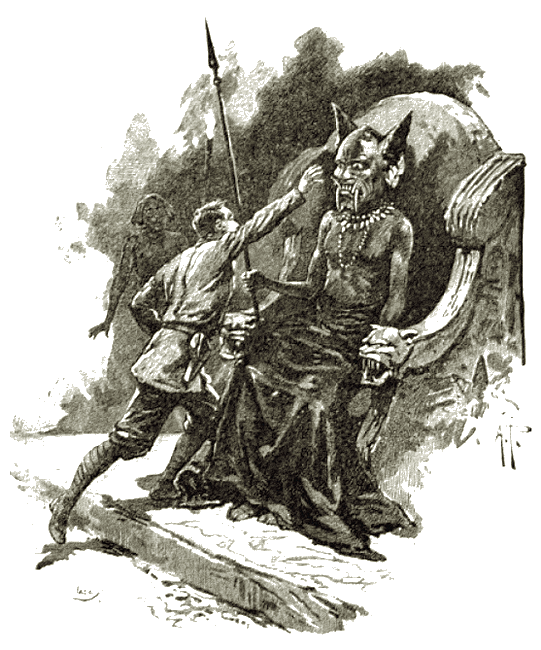
Denviers rushed forward.
"Quick, Harold!" exclaimed Denviers, as he saw the momentary panic which his action had caused among the superstitious Tamils. "On to the entry!" We bounded over the guards as they lay prostrate, and a moment afterwards were rushing headlong towards the entrance of the grotto. Our escape was by no means fully secured, however, for as we emerged we found several Tamils prepared to bar our further advance.
Denviers dashed his fist full in the face of one of the yelling savages, and in a moment got possession of the spear which he had poised, while the whirl of Hassan's blade cleared our path. I heard the whirr of a spear as it narrowly missed my head and pierced the ground before me. Wrenching it out of the hard ground I followed Hassan and Denviers as they darted up the zigzag path. On we went, the savages hotly pursuing us, then those in the van stopped until the others from the cave joined them, when they all made a mad rush together after us. Owing to the path zigzagging as it did, we were happily protected in a great measure from the shower of spears which fell around us.
We had nearly reached the top of the path when, turning round, I saw that our pursuers were only a few yards away, for the savages seemed to leap rather than to run over the ground, and certainly would leave us no chance to reach our boat and push off from them. Denviers saw them too, and cried to me:—
"Quick, Harold, lend Hassan and me a hand!" I saw that they had made for a huge piece of granite which was poised on a hollow, cup-like base, and directly afterwards the three of us were behind it straining with all our force to push it forward. The foremost savage had all but reached us when, with one desperate and successful attempt, we sent the monster stone crashing down upon the black, yelling horde!
We stopped and looked down at the havoc which had been wrought among them; then we pressed on, for we knew that our advantage was likely to be only of short duration, and that those who were uninjured would dash over their fallen comrades and follow us in order to avenge them.
Almost immediately after we reached the spot where our boat was moored we saw one of our pursuers appear, eagerly searching for our whereabouts. We hastily set the sail to the breeze, which was blowing from the shore, while the savage wildly urged the others, who had now reached him, to dash into the water and spear us.
Holding their weapons between their teeth, fully twenty of the blacks plunged into the sea and made a determined effort to reach us. They swam splendidly, keeping their fierce eyes fixed upon us as they drew nearer and nearer.
"Shall we shoot them?" I asked Denviers, as we saw that they were within a short distance of us.
"We don't want to kill any more of these black man-eaters," he said; "but we must make an example of one of them, I suppose, or they will certainly spear us."
I watched the savage who was nearest to us. He reached the boat, and, holding on by one of his black paws, raised himself a little, then gripped his spear in the middle and drew it back. Denviers pointed his pistol full at the savage and fired. He bounded completely out of the water, then fell back lifeless among his companions! The death of one of their number so suddenly seemed to disconcert the rest, and before they could make another attack we were standing well out to sea. We saw them swim back to the shore and line it in a dark, threatening mass, brandishing their useless spears, until at last the rising waters hid the island from our view.
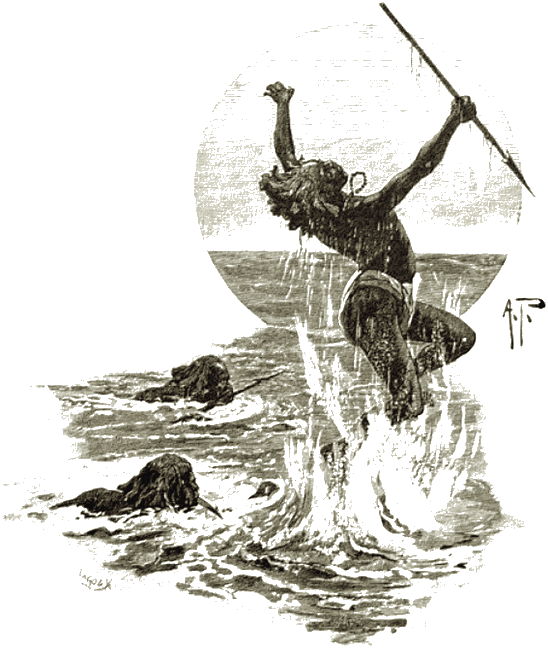
He bounded completely out of the water.
"A sharp brush with the niggers, indeed!" said Denviers. "The worst of it is that unless we are picked up before long by some vessel we must make for some part of the island again, for we must have food at any cost."
We had not been at sea, however, more than two hours afterwards when Hassan suddenly cried:—
"Sahibs, a ship!"
Looking in the direction towards which he was turned we saw a vessel with all sails set. We started up, and before long our signals were seen, for a boat was lowered and we were taken on board.
"Well, Harold," said Denviers, as we lay stretched on the deck that night, talking over our adventure, "strange to say we are bound for the country we wished to reach, although we certainly started for it in a very unexpected way."
"Did the sahibs fully observe the stone which was hurled upon the savages?" asked Hassan, who was near us.
Denviers turned to him as he replied:—
"We were in too much of a hurry to do that, Hassan, I'm afraid. Was there anything remarkable about it?"
The Arab looked away over the sea for a minute—then, as if talking to himself, he answered: "Great is Allah and his servant Mahomet, and the strange the way in which he saved us. The huge stone which crushed the savages was the same with which they have destroyed their victims in the hollowed-out mortar in which it stood! I have once before seen such a stone, and the death to which they condemned us drew my attention to it as we pushed it down upon them."
"Then," said Denviers, "their strange monarch was not disappointed after all in his sentence being carried out—only it affected his own subjects."
"That," said Hassan, "is not an infrequent occurrence in the East; but so long as the proper number perishes, surely it matters little who complete it fully."
"A very pleasant view of the case, Hassan," said Denviers; "only we who live Westward will, I hope, be in no particular hurry to adopt such a custom; but go and see if you can find out where our berths are, for we want to turn in." The Arab obeyed, and returned in a few minutes, saying that he, the unworthy latchet of our shoes, had discovered them.
Roy Glashan's Library
Non sibi sed omnibus
Go to Home Page
This work is out of copyright in countries with a copyright
period of 70 years or less, after the year of the author's death.
If it is under copyright in your country of residence,
do not download or redistribute this file.
Original content added by RGL (e.g., introductions, notes,
RGL covers) is proprietary and protected by copyright.